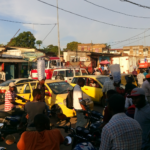Bulletin of the Atomic Scientists Names Rieser Award Recipient
By Bulletin Staff | December 9, 2015
For Immediate Release: December 9, 2015
Bulletin Media Contact: Janice Sinclaire, [email protected]
CHICAGO – December 9, 2015 – The Bulletin of the Atomic Scientists has named Moritz Kütt its first annual Leonard M. Rieser Award recipient. The Rieser Award was established in order to recognize outstanding emerging science and security experts who are passionate about connecting scientific research to policy outcomes. Inaugurated in 2015, the Rieser Award is selected by the Bulletin’s editorial team from among their Voices of Tomorrow essayists--new authors and rising stars who write with distinction about at least one of the Bulletin's core issues: nuclear weapons, climate change, growing energy demands, biosecurity, and threats from emerging technologies.
Kütt’s essay, “Arms-control lessons from the Volkswagen scandal,” examines the recent Volkswagen emissions test cheating scandal and what it means for arms control regimes. His essay argues that arms-control verification measures rely on similarly complex and proprietary technology, rendering independent scrutiny difficult. As Kütt writes: “As long as nations take the trouble and risks to construct clandestine facilities for weapon production, what would stop them from manipulating verification devices?”
Kütt provides several examples of how proprietary systems developed by one country are often mistrusted by others, and how this mistrust can interfere with the cooperation and confidence necessary for any type of arms control. He concludes that scientists, engineers, and the arms-control community at large should make efforts to develop new tools based on open source norms, and invites skilled computer experts from outside of the arms control community into the conversation.
In selecting the Rieser Award recipient from among the 12 Voices of Tomorrow essays posted in 2015, Bulletin editor John Mecklin praised Kütt’s intimate knowledge of the subject matter and “deft explanatory touch.”
The Rieser Award is the capstone of the Bulletin’s Next Generation Program, created to ensure that new voices, steeped in science and public policy, have a trusted platform from which to address existential challenges and threats. The program includes the Rieser Award and the Voices of Tomorrow series from which the recipient is chosen, as well as a series of communications training workshops for emerging science and security leaders.
Leonard M. Rieser (1922-1998), for whom the Rieser Award is named, was the Board Chair at the Bulletin from 1984 until his death in 1998. He worked on the Manhattan Project while a graduate student at the University of Chicago, and he went on to a distinguished academic career as a professor and provost of Dartmouth College. He strongly believed in the ability of the next generation to play a critical role in finding solutions to persistent global problems. The recipient of the Rieser Award receives $1,000, an annual subscription to the Bulletin’s subscription journal, and travel and lodging to the Bulletin’s annual Clock Symposium in Chicago in 2016.
The Bulletin of the Atomic Scientists engages science leaders, policy makers, and the interested public on topics of nuclear weapons and disarmament, climate change, the changing energy landscape, and emerging technologies. We do this through our award-winning journal, iconic Doomsday Clock, public access website, and regular set of convenings. With smart, vigorous prose, multimedia presentations, and information graphics, the Bulletin puts issues and events into context and provides fact-based debates and assessments. For 70 years, the Bulletin has bridged the technology divide between scientific research, foreign policy, and public engagement.
Bulletin Media Contact: Janice Sinclaire, [email protected]
###
Together, we make the world safer.
The Bulletin elevates expert voices above the noise. But as an independent nonprofit organization, our operations depend on the support of readers like you. Help us continue to deliver quality journalism that holds leaders accountable. Your support of our work at any level is important. In return, we promise our coverage will be understandable, influential, vigilant, solution-oriented, and fair-minded. Together we can make a difference.














